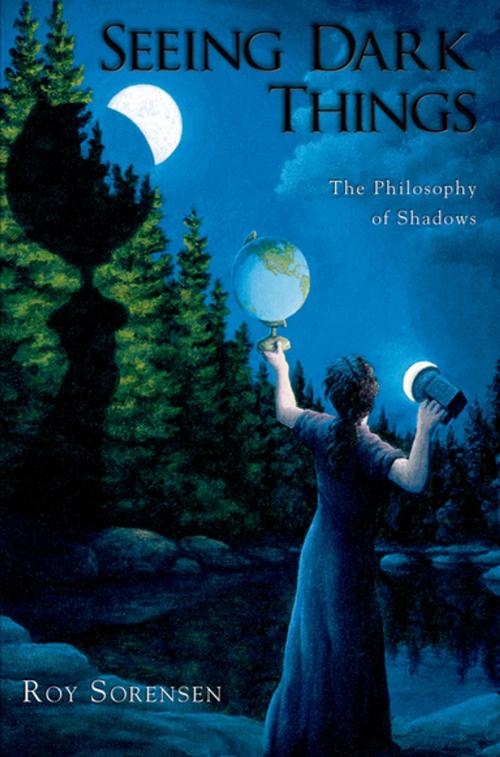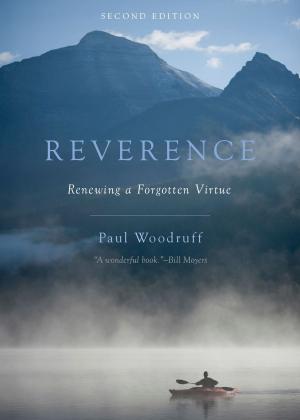Seeing Dark Things
The Philosophy of Shadows
Nonfiction, Religion & Spirituality, Philosophy, Metaphysics, Mind & Body| Author: | Roy Sorensen | ISBN: | 9780199886791 |
| Publisher: | Oxford University Press | Publication: | January 8, 2008 |
| Imprint: | Oxford University Press | Language: | English |
| Author: | Roy Sorensen |
| ISBN: | 9780199886791 |
| Publisher: | Oxford University Press |
| Publication: | January 8, 2008 |
| Imprint: | Oxford University Press |
| Language: | English |
If a spinning disk casts a round shadow does this shadow also spin? When you experience the total blackness of a cave, are you seeing in the dark? Or are you merely failing to see anything (just like your blind companion)? Seeing Dark Things uses visual riddles to explore our ability to see things that do not reflect light. Shadows and holes are anomalies for the causal theory of perception, which states that anything we see must be a cause of what we see. This requirement neatly explains why you see the front of a book's jacket and not its rear when you look at it face-on. However, the causal theory has trouble explaining how you manage to see the black letters on its surface. The letters are made visible by the light they fail to reflect rather than by the light they reflect. Nevertheless, Roy Sorensen defends the causal theory of perception by treating absences as causes. His fourteen chapters draw heavily on common sense and psychology to vindicate the assumption that we perceive absences. Seeing Dark Things is philosophy for the eye. It contains fifty-nine figures designed to prompt visual judgment. Sorensen proceeds bottom-up from observation rather than top-down from theory. He regards detailed analysis of absences as premature; he hopes a future theory will refine the pictorial thinking stimulated by the book's riddles. Just as the biologist pursues genetics with fruit flies, the metaphysician can study absences by means of shadows. Shadows are metaphysical amphibians with one foot on the terra firma of common sense and the other in the murky waters of nonbeing. Sorensen portrays the causal theory of perception's confrontation with the shadows as a triumph against alien attack - a victory that deepens a theory that resonates profoundly with common sense and science. In sum, Seeing Dark Things is an unorthodox defense of an orthodox theory. "Seeing Dark Things is an adventurous philosophical exercise in the ontology and epistemology of the commonsense world. Its treatment of the many puzzles that surround such putative 'negative' entities as shadows and holes will make it a classic on the literature on privations for many yeas to come. The book is also a wonderful example of how philosophy can be done without falling into the traps of the academic rigmarole. Sorensen is truly unique in his capacity to bring together classic philosophers, contemporary authors, and ticklish anecdotes." - Achille Varzi, Columbia University "This is a wonderful book, full of a profound, unsettling cleverness and weirdly satisfying counter-intuitiveness that the subject requires...a great book." - Richard Marshall, Bookforum "Sorensen is an extraordinarily fertile and imaginative philosopher, drawing widely on philosophy, physics, biology and vision science to mine his chosen quarry. His arguments, anecdotes and examples are always engaging. Add them to his effortless style and you have a rare commodity - a book of serious philosophy that many non-professionals will enjoy." - Ian Phillips, Times Literary Supplement "Sorensen's book is certainly fascinating and richly thought-provoking... he argues carefully and clearly in favour of his key claims, all of which merit very serious consideration, even if they sometimes provoke one to construct and defend alternative views. That, however, is surely the hallmark of the very best kind of philosophy writing. Seeing Dark Things is a model of this kind." - E.J. Lowe, Philosophy
If a spinning disk casts a round shadow does this shadow also spin? When you experience the total blackness of a cave, are you seeing in the dark? Or are you merely failing to see anything (just like your blind companion)? Seeing Dark Things uses visual riddles to explore our ability to see things that do not reflect light. Shadows and holes are anomalies for the causal theory of perception, which states that anything we see must be a cause of what we see. This requirement neatly explains why you see the front of a book's jacket and not its rear when you look at it face-on. However, the causal theory has trouble explaining how you manage to see the black letters on its surface. The letters are made visible by the light they fail to reflect rather than by the light they reflect. Nevertheless, Roy Sorensen defends the causal theory of perception by treating absences as causes. His fourteen chapters draw heavily on common sense and psychology to vindicate the assumption that we perceive absences. Seeing Dark Things is philosophy for the eye. It contains fifty-nine figures designed to prompt visual judgment. Sorensen proceeds bottom-up from observation rather than top-down from theory. He regards detailed analysis of absences as premature; he hopes a future theory will refine the pictorial thinking stimulated by the book's riddles. Just as the biologist pursues genetics with fruit flies, the metaphysician can study absences by means of shadows. Shadows are metaphysical amphibians with one foot on the terra firma of common sense and the other in the murky waters of nonbeing. Sorensen portrays the causal theory of perception's confrontation with the shadows as a triumph against alien attack - a victory that deepens a theory that resonates profoundly with common sense and science. In sum, Seeing Dark Things is an unorthodox defense of an orthodox theory. "Seeing Dark Things is an adventurous philosophical exercise in the ontology and epistemology of the commonsense world. Its treatment of the many puzzles that surround such putative 'negative' entities as shadows and holes will make it a classic on the literature on privations for many yeas to come. The book is also a wonderful example of how philosophy can be done without falling into the traps of the academic rigmarole. Sorensen is truly unique in his capacity to bring together classic philosophers, contemporary authors, and ticklish anecdotes." - Achille Varzi, Columbia University "This is a wonderful book, full of a profound, unsettling cleverness and weirdly satisfying counter-intuitiveness that the subject requires...a great book." - Richard Marshall, Bookforum "Sorensen is an extraordinarily fertile and imaginative philosopher, drawing widely on philosophy, physics, biology and vision science to mine his chosen quarry. His arguments, anecdotes and examples are always engaging. Add them to his effortless style and you have a rare commodity - a book of serious philosophy that many non-professionals will enjoy." - Ian Phillips, Times Literary Supplement "Sorensen's book is certainly fascinating and richly thought-provoking... he argues carefully and clearly in favour of his key claims, all of which merit very serious consideration, even if they sometimes provoke one to construct and defend alternative views. That, however, is surely the hallmark of the very best kind of philosophy writing. Seeing Dark Things is a model of this kind." - E.J. Lowe, Philosophy















